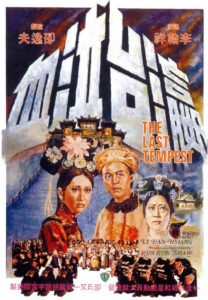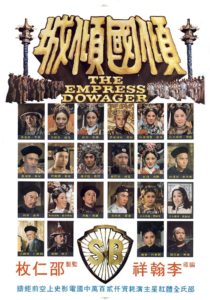The Empress Dowager
倾国倾城
Hong Kong, 1975, colour, 2.35:1, 130 mins.
Director: Li Hanxiang 李翰祥.
Rating: 6/10.
The Last Tempest
瀛台泣血
Hong Kong, 1976, colour, 2.35:1, 114 mins.
Director: Li Hanxiang 李翰祥.
Rating: 7/10.
Two-part saga, about reform struggles near the end of the Qing dynasty, starts as a monumental, palace-set Greek tragedy and builds to a vigorous yet moving finale.
The Empress Dowager. Beijing, May 1894. The Manchu Qing dynasty has been ruling the country for almost 250 years, and empress dowager Cixi (Lu Yan) exercises supreme power through her sickly nephew Zaitian (Di Long), known as the Guangxu emperor, who was given the title at the age of three. Now 22, and with Cixi officially retired from governance, Zaitian has theoretically been ruling in his own name for the past five years. However, he is stuck in a loveless marriage to Jingfen (Ling Bo), arranged by Cixi, and with two concubines, Zhen (Xiao Yao) and her elder sister Jin (Chen Ping), also selected by Cixi. Unlike his aunt, he has reformist sympathies: “If the Qing dynasty doesn’t collapse, heaven must be blind.” In the south, rebels who want to make China a republic recently seized Guangzhou and their leader fled to Macau. Meanwhile, power struggles continue inside the palace in Beijing, led by chief eunuch Li Lianying (Miao Tian) and, initially, his junior-cum-spy, the teenaged Kou Liancai (Jiang Dawei). The latter, however, turns against Li Lianying when he realises the truth of what Zaitian has been saying about Li Lianying’s scheming on behalf of Cixi. Zaitian tries to assert himself before Li Lianying and orders the latter to be beaten. Cixi arrives and supports Li Lianying, who later gets his revenge on Zaitian’s favourite concubine. The weakness of the Qing army is shown when the Japanese attack Tianjin and China is forced to conclude a humiliating peace treaty in Apr 1895. During a long post mortem at the palace, Cixi, in front of the sickly Zaitian, gets rid of the emperor’s faithful advisors, tutor Weng Tonghe (Zhang Ying) and imperial prince Gong (Hao Lvren). Gong takes the opportunity to lambast Cixi for her tyrannical attitudes and Zaitian for his weakness. Taken home during a violent rainstorm, Gong catches pneumonia and dies. Later, after a brave petition and speech, Kou Liancai, who had previously told Cixi that she doesn’t know her friends from her enemies, is led  away to be executed. The Last Tempest. Beijing, Jun 1898. The so-called Hundred Days’ Reform decree is issued by emperor Zaitian on 11 Jun. Cixi and her supporters impatiently bide their time and prepare to stage a coup when Zaitian and empress Jingfen (Ling Bo) review the army in Tianjin. Though he is a reformist, Zaitian’s wide-ranging moves on social, political and legal levels displease both traditionalists and revolutionaries, and he and leading reformer Tan Sitong (Yue Hua) find themselves betrayed by Yuan Shikai (Huang Xin), a general whom they had asked for help against Cixi’s planned coup. Cixi rails against Zaitian and his wife; the latter is imprisoned and Zaitian is sent to the lakeside Yingtai pavilion, close to the Forbidden City, to “rest”. On 28 Sep Tan Sitong is beheaded. In his final speech to Cixi he says that all he wanted was a constitutional monarchy and he now regrets not joining the revolutionaries. On his way to execution he meets Zaitian for the last time. Their reforms had lasted just over 100 days.
away to be executed. The Last Tempest. Beijing, Jun 1898. The so-called Hundred Days’ Reform decree is issued by emperor Zaitian on 11 Jun. Cixi and her supporters impatiently bide their time and prepare to stage a coup when Zaitian and empress Jingfen (Ling Bo) review the army in Tianjin. Though he is a reformist, Zaitian’s wide-ranging moves on social, political and legal levels displease both traditionalists and revolutionaries, and he and leading reformer Tan Sitong (Yue Hua) find themselves betrayed by Yuan Shikai (Huang Xin), a general whom they had asked for help against Cixi’s planned coup. Cixi rails against Zaitian and his wife; the latter is imprisoned and Zaitian is sent to the lakeside Yingtai pavilion, close to the Forbidden City, to “rest”. On 28 Sep Tan Sitong is beheaded. In his final speech to Cixi he says that all he wanted was a constitutional monarchy and he now regrets not joining the revolutionaries. On his way to execution he meets Zaitian for the last time. Their reforms had lasted just over 100 days.
REVIEW
The mainstream Mandarin industry was well represented [at the 1976 London Film Festival] by the giant two-part study by director Li Hanxiang 李翰祥 of the Qing dynasty – The Empress Dowager 倾国倾城 and The Last Tempest 瀛台泣血. The films were shot together over a 10-month period [summer 1974 to winter 1974/75], largely in sequence, and then edited and released separately [11 months apart]; originally planned as one film under the first title, the script was expanded during shooting when Li, an experienced and highly organised director, found he was going to have enough material for a two-part work. The period treated is naturally a favourite in Chinese cinema: the last years of the Dowager Empress Cixi, ruling a China fraught with reformists, revolutionaries and reactionaries through her son, the weak puppet-emperor Guangxu. Of recent works, Boxer Rebellion 八国联军 (1976) by Zhang Che 张彻 treats of the period from the point-of-view of the Boxers, while his earlier Iron Bodyguard 大刀王五 (1973, co-dir. Bao Xueli 鲍学礼) is exactly coincidental with events of The Last Tempest, ending precisely with the execution of the reformist Tan Sitong. But where Zhang’s direction is as energetic as the martial arts practised, Li’s is massive and contemplative: Empress is constructed in great blocks of dialogue, major setpieces in generally static locations, with events, as in Greek tragedy, reported by messengers from outside the palace. The final reels are almost entirely composed of three great “farewell” performances, one of which, by Eunuch Kou (Jiang Dawei 姜大卫 [David/John Chiang]), is dramatically important in that his has been a neutral role, an innocent reflection of all the political forces at work in the palace. Tempest, amazingly, is constructed on a completely different basis – a vigorous yet moving finale after the preceding adagio, with revelatory playing by Di Long as Guangxu and a richly-woven portrayal of the ruthless empress by Lu Yan 卢燕 [Lisa Lu], who returned to Hong Kong from her home in America specially to make the picture. Lu, born in Beijing but living in the US since the 1950s, will be familiar to many viewers from her roles (which started with a barmaid in Frank Borzage’s China Doll, 1958) in The Mountain Road (1960), Rider on a Dead Horse (1962) and Womanhunt (1962); she also played the part of the woman who nurses Marlon Brando to recovery in One-Eyed Jacks (1961), but her part was largely consigned to the cutting-room floor when the picture was drastically shortened. An intelligent and astute actress, she has recently been more active in Mandarin film circles (The Star 星语, 1976, by [Taiwan director] Liu Jiachang 刘家昌, her latest part), and her amazing transformation into the malevolent Cixi, which even surprised director Li, is a worthy antidote to her moving and controlled portrayal of Mrs. Dong in The Arch 董夫人 (1968), by [Hong Kong director] Tang Shuxuan 唐书璇.
[The first film’s Chinese title is a four-character phrase referring to a woman’s beauty that is so great it can bring down an entire country. The second means “Ying Pavilion Weeps Blood”, referring to the place where the young emperor was put under house arrest by the empress dowager.]
CREDITS
Presented by Shaw Brothers (HK). Produced by Shaw Brothers (HK).
Script: Li Hanxiang. Photography: Lin Chao [Lin Huachao]. Editing: Jiang Xinglong. Music: Chen Yongyu [Chen Xunqi/Frankie Chan]. Art direction: Chen Jingsen. Costume design: Liu Jiyou. Sound: Wang Yonghua.
Cast: The Empress Dowager: Lu Yan [Lisa Lu] (Cixi, empress dowager), Di Long (Zaitian, Guangxu emperor), Xiao Yao (Zhen, imperial concubine), Miao Tian (Li Lianying, chief eunuch), Jiang Dawei [David/John Chiang] (Kou Liancai), Ling Bo [Ivy Ling] (Jingfen, empress), Tian Ni (Li), Chen Ping (Jin, concubine, elder sister of Zhen), Shen Lao (Wang Shang, eunuch), Zhang Ying (Weng Tonghe, imperial tutor), Gu Feng (Li Hongzhang), Hao Lvren (Gong, imperial prince), Li Pengfei (Chun, imperial prince), Yang Zhiqing (Xu Tong, minister), Wang Xia (Gangyi), Jiang Nan (Zaiyi), Jing Miao (Rong Lv, minister), Tian Qing (Cheng Yuelou), Huang Xin (Yuan Shikai), Ouyang Shafei (concubine), Luo Bingqing, Chen Sijia (governor’s daughters), Lu Wei, Wang Hanchen, Jiang Yang (court officials), Wang Qinghe, Dong Wei (eunuchs), Chen Meihua, Liu Yaying, You Hui, Yuan Manzi (ladies-in-waiting), An Jingwen, Liu Huiling, Su Zhen, Dan Na, Hu Qihong, Li Qingkun, Ling Han, Jin Xin, Guan Ren, Mi Renqing, Lv Hong, Yang Qi. The Last Tempest: Di Long (Zaitian, Guangxu emperor), Lu Yan [Lisa Lu] (Cixi, empress dowager), Xiao Yao (Zhen, imperial concubine), Miao Tian (Li Lianying, chief eunuch), Wang Yu (Zhang Jinxi, eunuch), Yue Hua (Tan Sitong), Ling Yun (Kang Youwei), Jiang Nan (Zaiyi), Jing Miao (Rong Lv, minister), Yang Zhiqing (Xu Tong, minister), Huang Xin (Yuan Shikai), Wang Xia (Gangyi), Lu Wei, Wang Hanchen (demoted officials), Ling Bo [Ivy Ling] (Jingfen, empress), Chen Ping (Jin, concubine, elder sister of Zhen), Ouyang Shafei (Duan’s wife), Hu Yinyin (Deling, photographer), Liu Huiling (Chun Shou), You Hui (Chun Yan), Shen Lao (Wang Shang, eunuch), Zhan Sen (palace guard), Guan Cong (Liu Guangdi), Jiang Yi (Lin Xu), Mai Ziyun (Yang Rui), Lu Haipeng (Yang Shenxiu), Wu Mengda [Ng Man-tat] (Kang Guangren), Wang Qinghe (Zhen’s guard), Ding Dong (palace guard), Lv Hong (Cixi’s maid).
Release: Hong Kong, 21 Mar 1975 (The Empress Dowager); 21 Feb 1976 (The Last Tempest).
(Review section originally published in UK monthly films and filming, Feb 1977, article on 1976 London Film Festival. Modern annotations in square brackets.)
